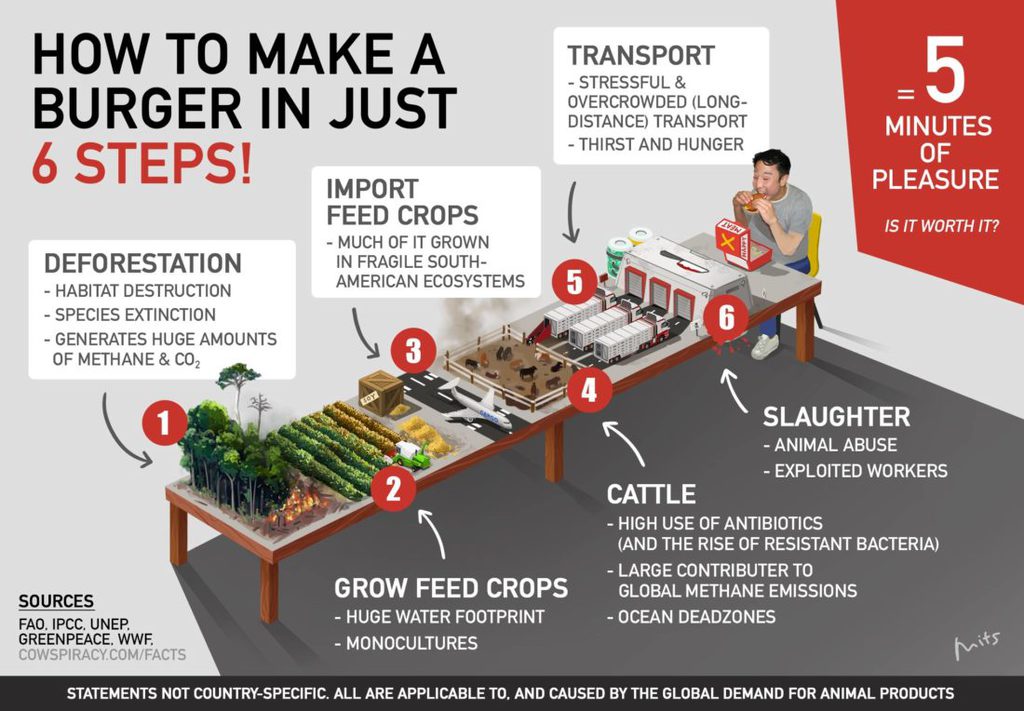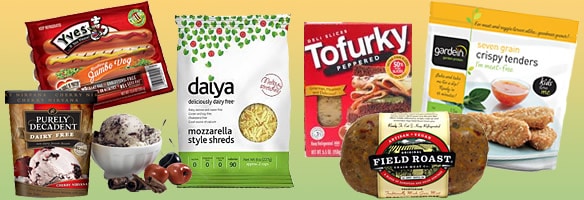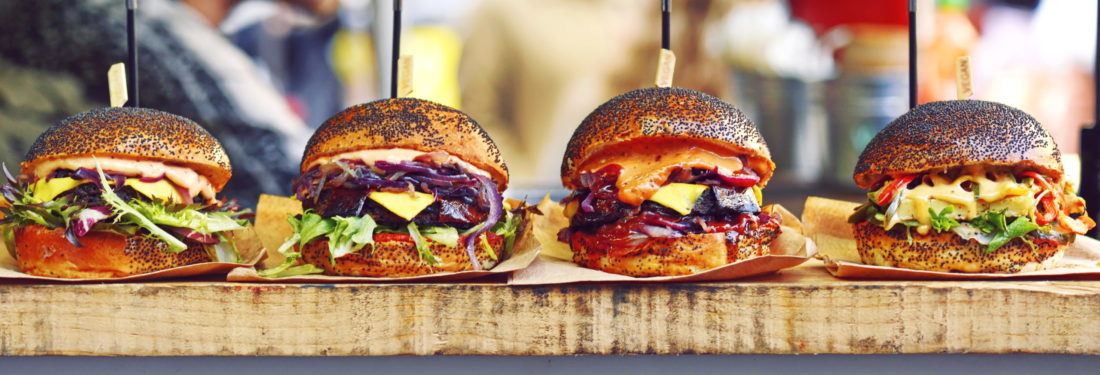Vegan meat has catapulted in popularity within the last year, as has the vegan population worldwide. For the past few years, the vegan meat industry has seen steady growth in mainstream popularity. From mid-2018 to mid-2019, sales of meat substitutes to restaurants have skyrocketed 268{967bf23b37ec6a673a83041540b3f904a815b4119ddf673afb961c1e7592ebdd} according to a report done by Dining Alliance. This is bringing many questions to the dinner table like, what is vegan meat? Is it healthier than animal meat? Is it cost-effective?
The rise in restaurant sales for vegan meat substitutes is mainly thanks to companies like Beyond Meat and Impossible Foods. These two plant-based meat companies have entered the fast-food market in restaurants like:
It is important to note, however, that places like Burger King, McDonald’s, and Carl’s Jr. serve their burgers with cheese and often mayo. They are also cooked on the same grills that cook the other menu items, so they cannot be considered 100{967bf23b37ec6a673a83041540b3f904a815b4119ddf673afb961c1e7592ebdd} vegan.
Why is vegan meat becoming so popular?
People around the world are beginning to notice the catastrophic condition our planet is in as far as the need for climate change. Especially with the news of controlled forest burns for agriculture landing on the home page of almost every news website. Americans are wanting to take a stand and are beginning to really look at their diets and reducing the amount of animal products we consume.
Not only this, but it is becoming more and more popular for people to strive to eat healthier. This includes more Earth-friendly food options like fruits, vegetables, and legumes, but it also includes vegan meat options as well. We are becoming more health and environmentally conscious as a whole, and this is the number one contributor for the rise in popularity for vegan meat options, but I will get into this more later.
The overall rise of veganism has given birth to vegan meal kits, which is a great way to introduce yourself to vegan meals.
What Is Vegan/Mock Meat?
First things first, it must be noted that there is a difference between vegan meat substitutes and meatless substitutes. Both of these products are used interchangeably with words like faux, fake, and mock meat substitutes; however, meatless substitutes are sometimes made with things that still are derived from animals. Two common ingredients are milk and eggs.
This is why it is important to remember that only vegan meat is genuinely a plant-based meat substitute. Many of the other meat substitute products on the market also contain things like soy protein or protein derived from wheat gluten. Valid vegan meat substitutes will be your best bet health-wise, though, and is the only logical option for vegans.
So what are they?
At their core, vegan meats are products created to mimic certain animal meat products. They are an excellent source for convenient protein (there is also vegan protein powder!) when you are a vegan in a pinch — made from a variety of plant-based ingredients and usually precooked, which adds to their convenience.
These products aren’t necessarily created to be eaten on a daily basis, though. Like red meat, vegan meat can become an unhealthy option if it is abused. That said, vegan meats are an excellent option for those that are transitioning into the vegan lifestyle and are looking for a nice replacement that copies the texture, taste, and even smell of some of their old favorite animal proteins.
Vegan meats are also fortified with many of the vitamins and minerals you are missing by not eating animal products, including healthy doses of cholesterol, iron, zinc, and vitamin B12.
If you are a vegan that doesn’t want your vegan meat to mimic the taste and texture of animal meat, there are vegan meat options that don’t closely resemble animal meat the way Impossible, and Beyond Meat products do. Companies like Quorn, Tofurky, and Boca don’t try to resemble animal products as closely, but they still are convenient sources of protein and nutrients.
Is Vegan/Mock Meat Healthy?
Eating too much of anything can be considered a bad thing. That is why it is important to remember than vegan meats are not meant to be eaten multiple times a day or even on a daily basis. Just like animal meats, vegan meats are intended to be consumed in moderation and on special occasions.
Americans have grown accustomed to eating meat with every meal, and when you are transitioning into veganism, this is something you will learn quickly; you simply don’t need meat or meat substitute to live a healthy life. In fact, more robust lives are lived with very little meat substitutes included in the diet.
Eating a vegan meat burger is by no means as healthy as other protein replacements, but it can be a healthier option than animal protein products.
Vegan meats are tailor-made, which gives them an upper hand over animal meat products. Vegan meat products can include as much protein, cholesterol, iron, and B12 as necessary for any one person’s dietary needs. With animal meat products, on the other hand, you kind of get what you get. Granted, a traditional serving of lean cut meat has all the necessary nutrients, but you are also exposing yourself to possible contaminations, pesticides, hormones and diseases with animal products.
Some of the ingredients in today’s vegan meat products include:
- Textured wheat protein
- Bean protein
- Sunflower
- Beetroot
- Coconut oil
- Potato protein
- Soy
- Yeast extract
- Salt
- Konjac gum
- Xanthan gum
- Soy or pea protein isolate
Not all vegan meats include these ingredients, but these are staples for the products on the market right now.
Salt in Vegan/Mock Meat:
Many vegan meats get a lot of flack for being loaded down with sodium. It is only recommended that we consume an average of one teaspoon of sodium a day. So when someone looks at the sodium content of their favorite vegan meat substitute and notice it has half or more of the daily salt recommendation, they begin to worry about the nutritious value of the product.
We must keep in mind that if we eat these in moderation, the salt levels are perfectly normal and healthy. This is definitely not something to boycott vegan meat over. Instead, simply enjoy them a few times a week rather than every day.
Is Vegan Meat Highly processed?
Another argument between new and old vegans is that vegan meat companies are dumping out highly processed vegan meats that aren’t as healthy as other options. Many people think this is giving vegan meat products a bad rep. The fact that vegan meat is gaining in popularity, and we are now seeing it in fast-food restaurants, is not helping this argument.
However, just like anything else in the world with a competitive market, not all brands are created equal, and you get what you pay for. It pays to educate yourself on the trustworthy brands if you are looking for the healthiest vegan meat options.
Just because you are looking for vegan meat options doesn’t mean you have to stick with processed meat substitutes, though. Here is a list of whole food options for meat replacement:
- Hemp seeds, flax seeds, pumpkin seeds, sunflower seeds
- Almonds, Walnuts, Pecans, Cashews
- Beans and legumes
- Chickpeas, Pinto
- Black beans, Kidney Beans
- Lentils
- Mushrooms
- Natto
- Jackfruit
- Quinoa, Long-grain brown rice
- Oats
- Tempeh, Tofu
A lot of these foods include the vitamins and minerals needed for maintaining a healthy weight and lifestyle. When combined with a healthy moderation of vegan meat substitutes, these whole food options are some of the best options out there.
The main thing to remember when you transition into veganism is why you started. Many people are doing it to be healthy, or for the environment or the animals. No matter what, remember that you can’t fall on convenience as an option every single day. There will be some learning and experimenting in the kitchen that goes along with the lifestyle, but it is one worth trying.
Is Vegan Meat Less Expensive Than Animal Meat?
In terms of vegan protein products, there are cheaper options than vegan meat. To put it simply, vegan meat brands are operating in a “free market”. For this reason, it is still more expensive to buy vegan meat substitutes instead of animal meat products. Vegan meat companies are having trouble keeping up with the demand for their products.
The vegan industry is growing at a rapid rate, but it is still a small industry. Because of this, vegan companies are having trouble negotiating prices on ingredients to make their products. This is another reason why costs for vegan meat are so high.
However, just because the market is like this now, doesn’t mean it isn’t on the road to change. The boom in sales at restaurants over the last year expresses this fact explicitly. It is becoming evident that the market has a need for vegan products, including vegan meat. Prices are expected to drop sooner rather than later.
The tipping point is expected to occur within the next ten years. Not only are we going to see lower prices on vegan meat (perhaps within the next five years), but all vegan products as a whole. The need for animal farms will decrease and make way for vegan plants. Financially speaking, it is cheaper to use the crops to make vegan meat patties than it is to use those same crops to feed the animals that we then eat.
Some of the more prominent meat-producing companies are starting to take notice of this as well. Tyson Foods has recently announced that they will also be joining the vegan meat market. The fact that they are seeing a profitable interest in the vegan meat industry shows the fact that prices are definitely on their way to being lowered across the board.
What Is the Environmental Impact?

Vegan meat absolutely has the potential to help turn around the rate of global pollution put out every year. It can end factory farming, address global warming, be a more sustainable way to get protein, as well as save animals and their habitats.
It is no lie that producing vegan meat at a large scale still requires the use of factories. However, even with a global takeover of vegan meat, we would still see a decrease in pollution, land use, and the use of water.
A study found the current environmental impact of food and the environmental impact of the vegan meat industry are drastically different. It also states that 33{967bf23b37ec6a673a83041540b3f904a815b4119ddf673afb961c1e7592ebdd} of Earth’s ice-free surface is used for the animal meat production industry, whether that be the farming factories themselves, or the croplands used to feed the animals.
The study also states that the beef production industry requires 28 times more land and 11 times more water compared to the vegan meat production industry. It also emits five times more greenhouse gases than the vegan meat industry as well. With a prominent vegan meat industry, we could gain our lands back and restore habitats for wildlife.
It is no question that the vegan meat industry has a bright and prosperous future. We are only at the beginning of what this industry is sure to become. The public is aware of the environmental concerns as well as the health concerns related to the animal meat production industry, and they are starting to make changes. Vegan meat may not be a healthy replacement for your everyday vegan diet, but it is a viable and sustainable option in moderation as you transition into veganism.
I wrote a recent article about protein; the number one question: Where to vegans get their protein? One of our readers, Marko M. Vegano (nice name, by the way… ), asked whether eating a steady diet of mock meats; those alternative meat products recently made popular by companies like Gardein and Beyond Meat, is a reasonable, safe thing to do.
Vegano wrote:
I love the Gardien and Beyond Meat products. They are loaded with proteins, but do have some have high sodium. I can eat a whole bag in one day. Three meals. I do include a side of grain or starches and a veg. And I eat fruits throughout the day. And also snack on nuts or include them in a salad or cereal. Is this safe to do?
In short, no… mock meats are processed foods, many are high in sodium and are highly processed; relying on such products as your main source of protein is not necessarily the healthiest way to eat. You’re better off getting the cast majority of your protein from whole foods, including legumes, nuts, seeds, and whole grains.
Mock meats are not new; they’ve been around for a very long time. Tofu and seitan have been used mainly in Asian societies for centuries; the history of tofu dates back to the Han Dynasty (206 – 220 BC). But today, when people think of mock meats, they are likely not thinking of tofu, they are probably thinking of those tasty highly processed packaged products from Gardein, Beyond Meat, etc.

Don’t get me wrong, I eat my share of these products; when we can’t think what to make for dinner, we might grab a package of Gardein from our freezer, pop it in the toaster oven and then typically serve it a tortilla filled with lots fresh greens, tomatoes, avocado, and a dash of hot sauce. Yum! We also eat Field Roast products, especially at Thanksgiving; my favorite holiday, makes my mouth water just thinking about it. That said, we don’t eat those products all that often. How often is it reasonable? Are they bad for you? Our friends at Berkeley Wellness wrote an excellent article on the subject of the emergence of fake meat as an acceptable meat alternative for both meat-eaters and non-meat-eaters alike. Here’s a snippet:
A downside is that meat substitutes are typically high in sodium, comparable to many deli meats. Some have more than 400 milligrams of sodium per serving. And unless they’re fortified with vitamins and minerals, as some are, they tend to be lacking in vitamin B12, iron, zinc, and other nutrients found in meat. Note also that many have long lists of additives, including artificial flavors, colorings, gums, sugars, and preservatives.
The eco-angle
You may think it’s environmentally virtuous to choose a veggie burger over a meat burger, yet mock meats are usually highly processed foods that are not eco-friendly in all ways. Vegetarian meals are generally associated with lower greenhouse gas emissions and less impact on global warming, but according to a 2010 paper in Food Research International, it takes about the same amount of energy to produce a pea-burger as it does a pork chop, calorie for calorie, because of the processing, storing, and other factors involved.
Then there are issues associated with the farming of soybeans. As some critics note, industrial soybean farming has devastated rainforests in Brazil, one of the world’s top soybean producers, and has taken over much of the cropland in America and wiped out grasslands at an accelerated pace in recent years—though, in reality, most soy is grown for animal feed, edible oil, and biofuel.
Another concern is how the beans are processed. Hexane, a chemical solvent used to remove the oil from soybeans in the manufacturing of most processed soy foods, is a neurotoxin and an air pollutant. If you want to avoid hexane-processed soy foods, buy USDA organic products, since hexane is banned in organic food production.
Many soy-based meat substitutes are also made from genetically modified (GMO) soybeans. Though the environmental and health effects of GMOs are still being debated, you can avoid them by looking for “GMO-free” on the label; by definition, certified organic foods are also GMO-free.
5 more faux-meat tidbits
- Meat substitutes vary a lot in fat, calories, sodium, protein, and other nutrients. In general, products made with soy protein, textured vegetable protein, or wheat gluten are higher in protein than those made primarily from whole vegetables and grains.
- Veggie meats are not necessarily vegan. Many contain egg whites (as a binder), casein (a milk protein), cheese (which also adds calories and fat), and some other animal-derived ingredients.
- Meat substitutes often contain common food allergens, including wheat, nuts, soy, and dairy. If you’re allergic to any of these, be sure to check the labels.
- Meat substitutes are far less likely to be contaminated with bacteria, such as E. coli, than real meat—though you should still follow the cooking directions carefully to be safe (and for the best taste and texture).
- Less-processed meat substitutes include tofu, tempeh, and seitan and can be used in place of meat in many recipes.
Faux meats, meat alternatives, mock meat, fake meat, meat analogues… whatever you call them, they mean the same thing. Wikipedia describes them as: a food made from non-meats, sometimes without other animal products, such as dairy. The market for meat imitations includes vegetarians, vegans, non-vegetarians seeking to reduce their meat consumption for health or ethical reasons, and people following religious dietary laws in Judaism, Islam, Hinduism, and Buddhism.
(by the way: BerkeleyWellness is a great website; they are the leading online resource for evidence-based wellness information, BerkeleyWellness.com is a collaboration between the School of Public Health at the University of California, Berkeley, and a national team of writers and editors. It features articles from the UC Berkeley Wellness Letter as well as original content and updates. )
I couldn’t agree with the Berkeley Wellness’ response to this issue more. My suggestion is that is you want to eat mock meats, have at it; but like most things in life, consume them in moderation, they should not be your primary source of protein.
Now it’s your turn:
Do you eat mock meats? If so, do you eat them frequently: Daily? Weekly? Four times a day? 😉









